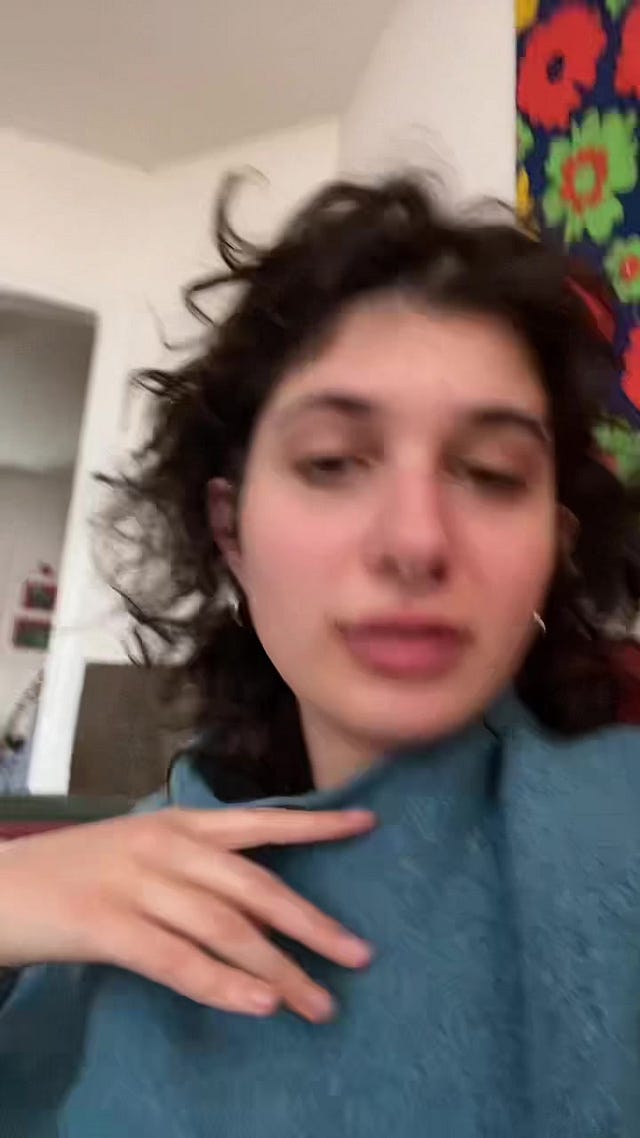Escaping the Male Gaze
By seeking an escape from being a woman

The New York Times has been running a series of articles on “The Inner Pandemic,” looking at the mental health struggles of young people who had their childhood or adolescence disrupted by covid.
The most recent installment, “A Teen’s Journey Into the Internet’s Darkness and Back Again,” focuses on the difficulty of finding your social life directed solely or primarily through the internet. The article takes C. as the central figure. C is now 22, and first began receiving requests for nude pictures from adults at age 10.
C now identifies as non-binary, and, in their own words, sees that new identity as a position of greater strength and safety:
During the pandemic, C adopted the pronoun “they.” The change reflected their understanding that they have “power over how people perceive me and how I perceive myself,” C said. “Instead of accepting the role that was put on me, I’ve made my own.”
“Now that I’m alive, I want to be alive and pursue music,” C said. That includes being comfortable appearing in online music videos and other social media: “I’m more complex than just being a little girl on the internet who’s, you know, just for looking at.”
C added: “In my adult nonbinary body, I don’t mind people looking at me, because I feel like I’m in control now.”
In a previous Other Feminisms post, I was reflecting on the push to use gender neutral language around birth and maternity, and some commenters asked what women had to lose from broader language.
One of my concerns is that it sometimes feels like the only part of being a woman we get to describe as particular to women is being the victim of sexism. If that’s what it means to be a woman, who doesn’t want to find an exit?
A little later that week, the Style section of the Times ran a piece on TikTok filters that let you show the asymmetries of your face, mirroring first one half of your face, then the other. The best summation of the feature went to “Olivia Alicandri, a 22-year-old stage crew worker for Blue Man Group in New York City: ‘Guys, new body dysmorphia filter just dropped!’”
 Tiktok failed to load.
Tiktok failed to load.Enable 3rd party cookies or use another browser
I have trouble really internalizing how much younger girls have grown up seeing (and judging) their faces. I’m somewhat prosopagnosic, which I think leaves me less attentive to all faces, including mine. I grew up with a subscription to Zillions, the kids magazine put out by Consumer Reports, ran regular features on how ads misrepresent reality in order to deceive you. I didn’t want to be pretty—I wanted to avoid being a chump.
Some of the pressures for young girls have been constant, but it seems like there’s a much more pervasive visual yardstick to measure yourself against (and worry you fall short of). Growing up, I read novels, where I had a limited ability to imagine what the protagonist looked like, but on social media, it’s the first thing you discover.



As I approach 40, I find myself constantly scanning the bodies and faces of women I encounter out in the world and attempting to judge whether they are older or younger than me. It’s as if I realized that my internal age clock needed re-calibrating, and I was still equating myself to women around 30. But I see myself being extremely judgmental about it, towards both myself and to these other women. “At least I don’t look as old as her.” “Ugh I wish I looked as young/cool/sophisticated as her.” It’s like I’m in high school again. I suppose measuring myself against real life women instead of airbrushed or photoshopped models is a better scenario? But I’d rather not be judging anyone at all.... so, to the point of your subject line, how do we also escape the female gaze, including the self gaze??
I’m in my early twenties and have never felt any sort of body image discomfort until I downloaded Tik Tok maybe a year ago. It distorted my ability to remember what most people look like because even random videos from small accounts featured really conventionally attractive women. I always understood beauty standards to be some sort of ideal that society thought women *should* look like, but knew most of my friends, family, colleagues didn’t actually look like that. Tik Tok’s model of viral, quick content consumption made me feel like the standards actually *are* how women look. I used to be okay being “average” because that’s, by definition, what a large number of people were. But Tik Tok made me feel like an aberration because it presented an “average” totally detached from reality. Coupling this with the drastic reduction in the time Gen Z people spend with actual people compared to other generations, I think it can change the way your brain subconsciously samples of reality in pernicious ways. I really encourage all my friends to ditch Tik Tok and think the worry many people have about it’s effect on kids, especially girls, is completely justified.